Outsourcing
Time and Materials vs Fixed Price: What Works Best
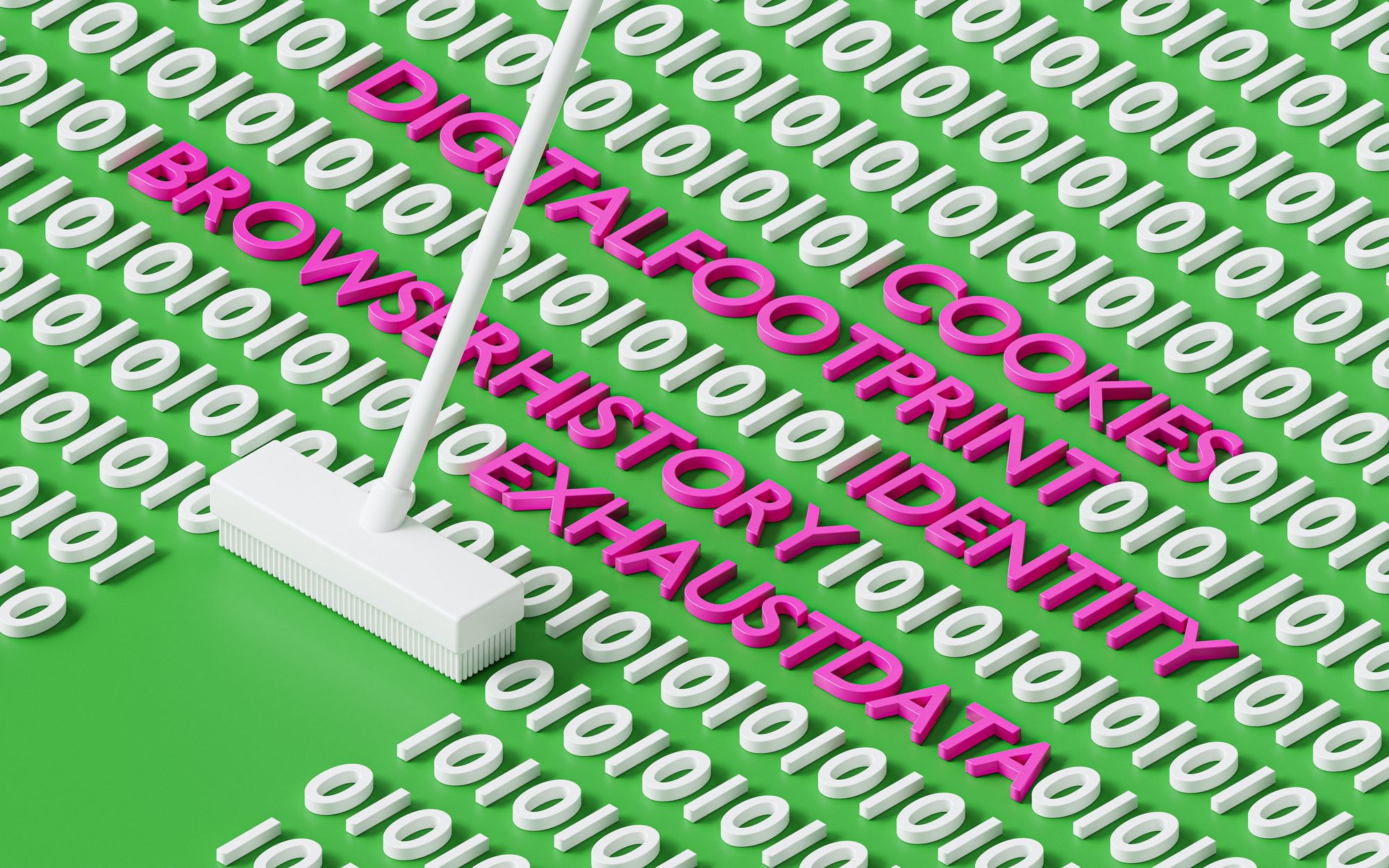
Let's start by looking at a simple, real-life situation to demonstrate the main difference between time and materials vs fixed price models. Imagine you are planning a trip and have 2 options: go on a pre-packaged tour or organize your own adventure.
Option 1. Choosing the pre-packaged tour offers a stress-free travel experience. Everything is pre-booked and clear, from tickets and accommodations to activities. This is similar to a fixed-price (FP) contract, where you know exactly what you're getting and how much it will cost.
Option 2. On the other hand, if you decide to plan your own trip, it's more similar to how a time and materials (T&M) contract works. You have the freedom to adapt your journey (workflow in our case) or change your path as you go. This approach offers greater flexibility and customization, but you'll need to stay open to changes, be ready to manage challenges and allocate time and budget accordingly.
Your choice between time and materials vs fixed price, just like travel style, depends on your preferences, risk tolerance, and how much you value flexibility over predictability. Finding the right balance for your needs is essential to reach the desired result, and we will help you with that in this blog post.
Time and Materials (T&M) Contracts: Brief Сharacteristics
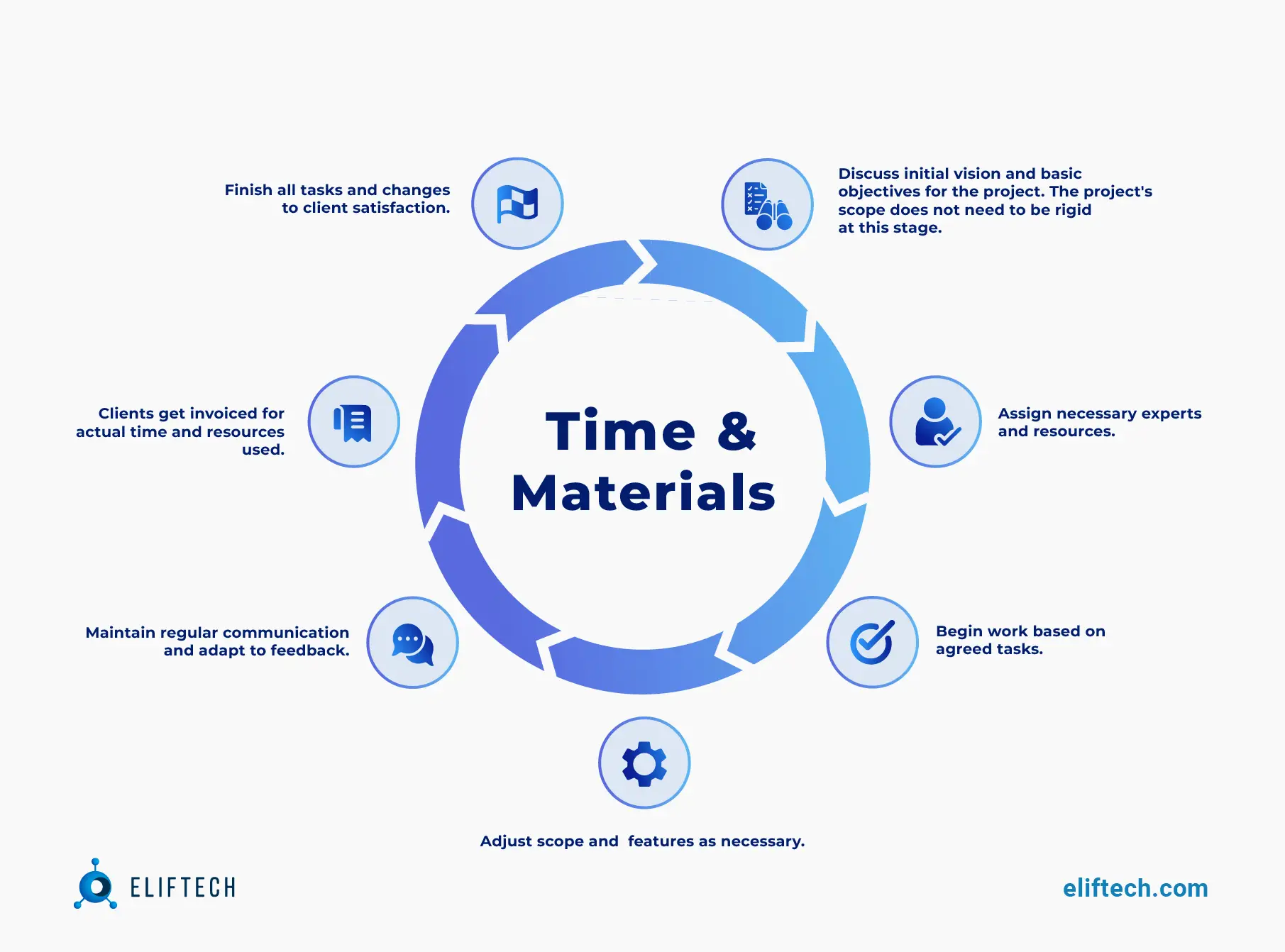
The time and materials (T&M) contract model is a flexible and adaptable contractual agreement system where clients are billed based on the actual time taken (the hours worked) and resources consumed (the materials used) by the contractor. This model deftly handles tasks as they come – the client outlines their requirements (like completing tasks A, B, and C), and the contractor charges them based on the time spent on these tasks and any associated costs. If you choose this model for hiring software product development services, you'll benefit from a high level of flexibility and high services' responsiveness for your business needs.
Time and material pricing is particularly favored in the outsourcing industry due to its inherent flexibility. Unlike the set-in-stone specifications of Fixed Bid contracts, T&M contracts do not require a predefined project plan. Therefore, they grant clients the autonomy to shift or adjust their project strategies such as objectives, budgets, or priorities as the project evolves.
In scenarios when time and material vs fixed price choice arise, it’s also important to note that when developers work under T&M contracts, they typically choose the Agile approach. The T&M model and the Agile approach share common principles that focus on flexibility, client collaboration, and iterative development.
This involves creating a plan for the project and dividing the work into time-limited "sprints" — development phases with a list of tasks organized by priorities. After each sprint, developers report on their progress and adjust the plan. If some tasks are unfinished, they are simply reorganized and added to the next sprint.
Time and Materials vs Fixed Price: When to Choose T&M Contracts
To identify when time and material pricing is the right fit, it's vital to assess the project's specific requirements and conditions. Here, we highlight key situations where T&M contracts could be the best option.
Scenario 1. You have unclear and evolving requirements
Time and material pricing is a smart choice when project requirements are unclear at the start or expected to change a lot. This scenario perfectly demonstrates the situation that most startups find themselves in. They often begin with a vision or a broad idea but need to build their assumptions and define their to-do activities gradually as they learn more about their market, users, and the challenges they encounter along the way.
Scenario 2. Your project scope is not obvious
When your project's goals are unclear or likely to change, T&M contracts are a great choice. With T&M, you aren't stuck with a fixed plan, so you can change the project's direction as you learn more or as external factors come into play. This adaptability keeps the project in sync with your evolving goals, and the development process flows in deep cooperation with you, so you will be glad to see the result.
Scenario 3. You expect iterative work
T&M contracts work well for projects that use an iterative approach. In these projects, work happens in stages, and features may need tweaking as you go. With T&M, you have the flexibility to support this iterative process. They provide room for businesses to experiment, pivot when needed, and adapt their strategies based on real-world feedback step by step.
Scenario 4. You need the freedom to changes
Unlike fixed-price contracts, in the T&M model, you can easily add or remove new ideas or features at any time. If you expect to change your project's direction, shift priorities, or make frequent fixes as things progress, T&M contracts let you do that easily. This flexibility is priceless because it lets you react quickly to new priorities, market shifts, or unexpected issues without being stuck in rigid plans.
Time and Materials Contract Pros and Cons
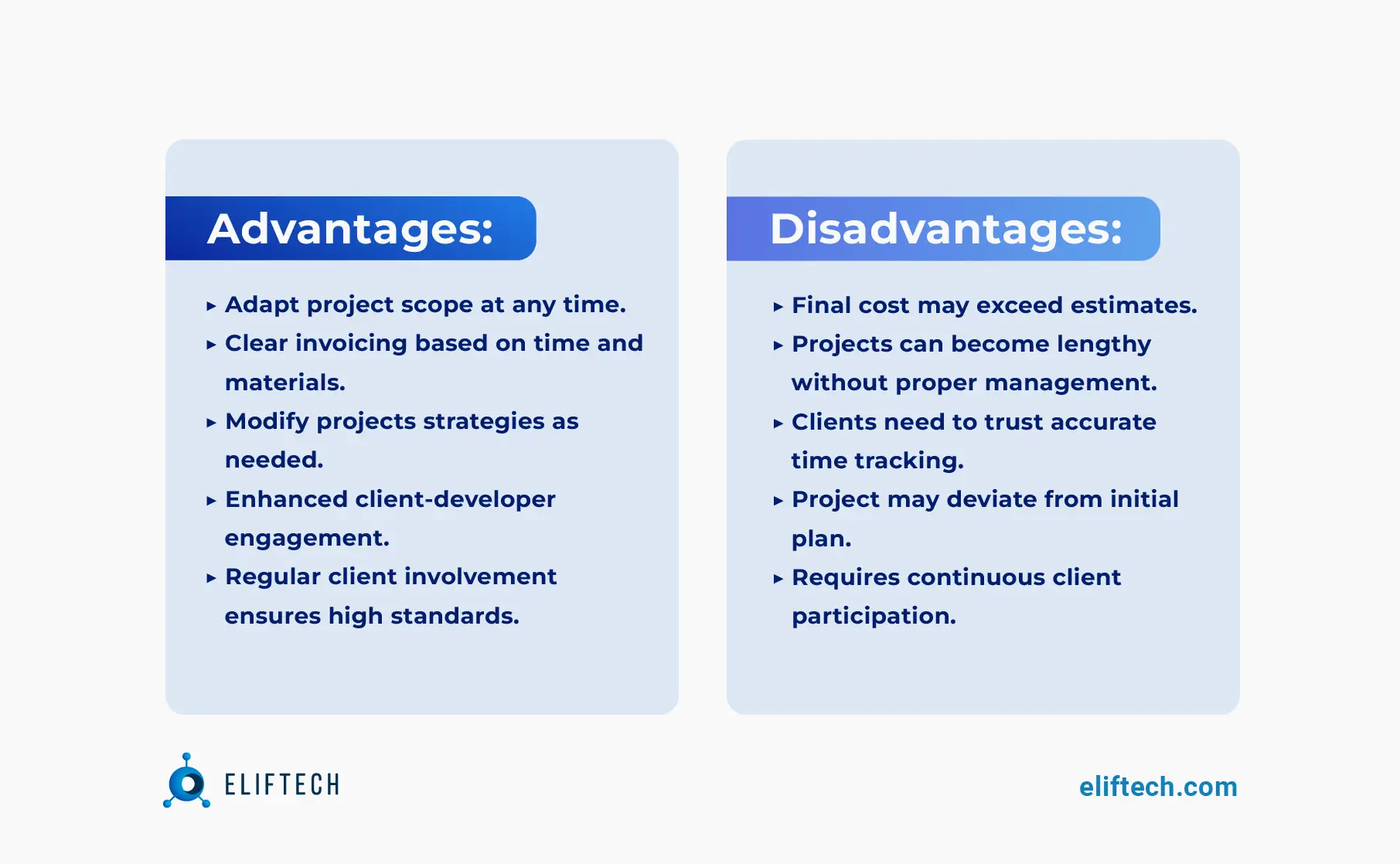
The time and material pricing model is favored in the realm of web or mobile app development services. Noted for its inherent flexibility and efficiency, it provides an exceptionally adaptable framework that actively responds to evolving customer needs. To better understand this model, let's discuss the distinct pros and cons it carries.
Pros of T&M Contracts
The T&M model is known for its inherent flexibility. It permits changes in project size and resource use as work progresses, an especially handy feature when the specific details of a project aren't fully established at its initiation.
Further, T&M contracts cater to a dynamic work scope. They're designed for larger projects where the path to the final goal may need ongoing adjustments. This makes T&M contracts particularly popular for startups and mid-sized companies that build their products progressively while making decisions throughout the process.
Better time management is another advantage of T&M contracts. In contrast to Fixed Price (FP) contracts that require significant upfront time investment, T&M contracts grant immediate project initiation. This model also continues to assess and increase team efficiency throughout the project.
T&M contracts also allow for greater control over the project at hand. As a client, you can engage with team members, provide guidance, adjust materials, and shift the project's focus as needed.
Importantly, T&M contracts are structured to prevent overspending. They ensure that expenditure is limited to the actual work done and that each project iteration is financially tracked. However, an inherent risk of this model is that the overall project spending may overshoot the initially estimated budget.
Finally, T&M contracts focus on guaranteeing the best results. They encourage ongoing collaboration and frequent client feedback to iteratively refine the end product.
Despite these advantages, potential challenges with the T&M model should not be overlooked.
The T&M contract model often requires deep and consistent client engagement throughout the development process. The client's continuous participation is integral for planning, decision-making, team management, and ensuring that the agreed-upon scope of work is delivered within the allocated hours.
Fixed Price (FP) Contracts: Brief Сharacteristics
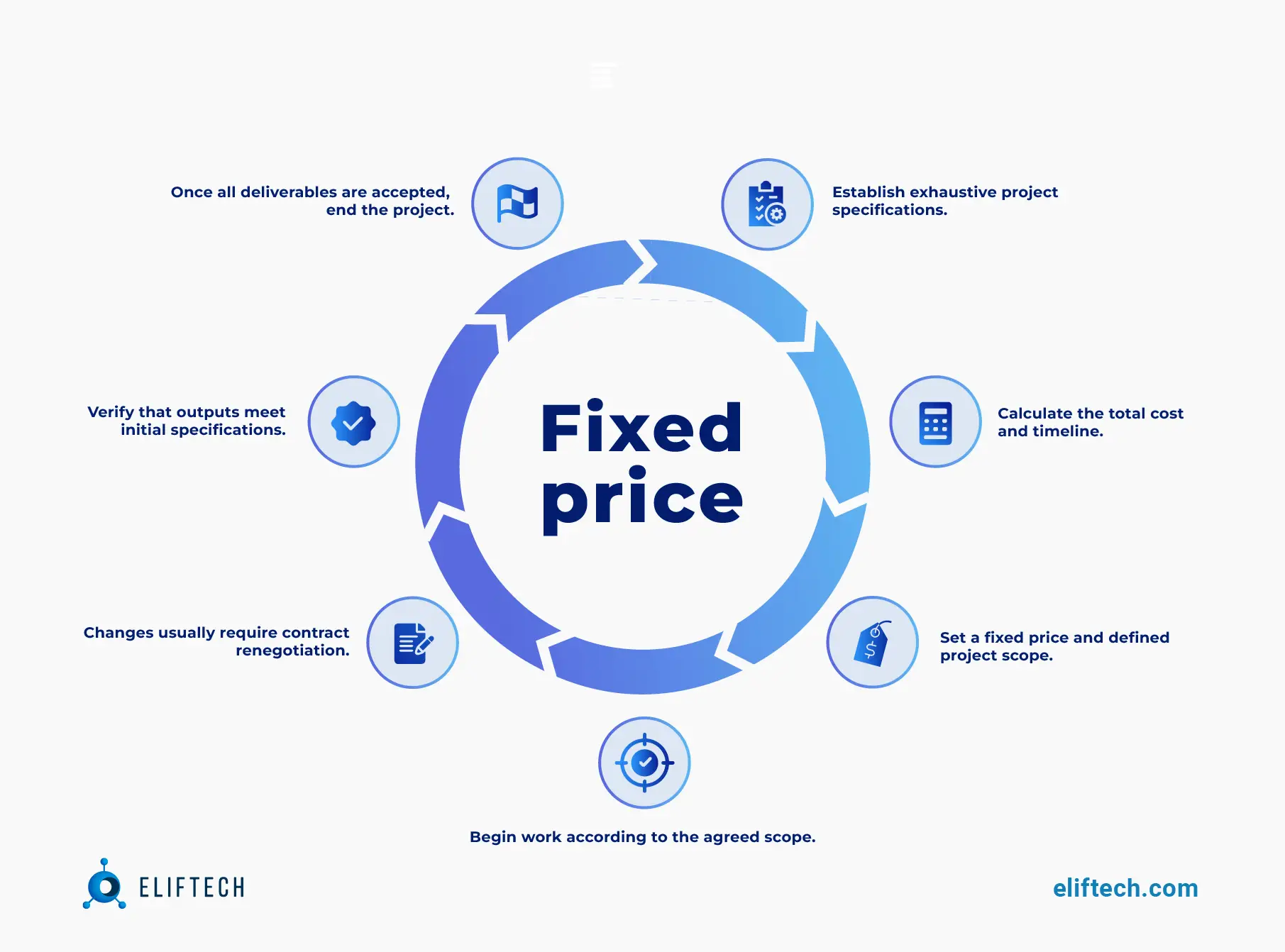
Fixed Price (FP) contract is a pre-established agreement between a client and a service provider. In this model, everything from the scope of work to the final cost is laid out before the project gets underway.
This model is particularly beneficial for clients who have a solid vision of the end product and favor a predictable, structured approach. FP contracts work well in projects where requirements are steady and clearly defined and align perfectly with the Waterfall methodology. This approach follows a step-by-step sequence where each phase has a set deadline, scope, goal, and outcome and must be completed before the next phase begins. However, making changes in a Waterfall environment can be difficult, often requiring a return to the initial stage and a comprehensive re-planning of the project.
While the FP contract model offers predictability, clarity, and low management needs, it isn't a one-size-fits-all solution. Projects with variable or unclear requirements might not gel well with the FP model. Should unexpected situations arise or the project scope changes, the inflexible nature of the FP approach can lead to difficulties.
We will now explore the conditions in which a Fixed Price Contract makes sense.
Time and Materials vs Fixed Price: When to Choose (FP) Contracts
Historically, early outsource mobile development agreements were based solely on the fixed price model. While the scenario has evolved significantly today, there remain many situations where an FP contract can be the perfect fit.
Scenario 1. You have clear requirements and fixed deadlines
In custom software development, predicting the final product can be tricky when you're just starting. It's difficult to know exactly what your users will like or how the market will change. Therefore, predicting your requirements can also be challenging, although it doesn't mean there are no such cases at all.
If you understand that this is your situation, then you might already have well-defined requirements and understand that tasks must be completed by a specific deadline. Fixed Price Contracts are a suitable choice for projects where time and budget have clear endpoints and where there is minimal room for changes.
Scenario 2. You have a restrictive or unchanging budget
For projects with a tight, unchanging budget, fixed project contracts bring financial stability. You know the project's cost from the start and understand that it cannot be changed, thereby avoiding unexpected costs or exceeding the budget. This financial certainty is crucial for businesses that require careful financial management. They cannot handle sudden budget shifts, and FP contracts help them maintain strong financial control, ensuring that every cent is used as intended.
Scenario 3. You want to build Minimum Viable Products (MVPs)
When you need MVP development services, FP contracts can be a valuable choice. MVPs usually have a well-defined scope with limited features. A fixed budget and timeline make this contract type an ideal fit for efficiently delivering a basic version of your product to the market.
However, not all startups can know everything at the start of building their MVPs. Thus, this approach typically works well for startups that can define clear requirements and accurately estimate all aspects of the project.
Scenario 4. Your project is small and scope-focused
For smaller projects or one-time tasks, there's usually no need for changes. It's like ordering a meal from a menu – you know what you want, and you can picture the outcome. In such cases, using a Time and Materials model doesn't make sense because you have a clear idea of what you need, and there's no ongoing adjustment required.
Fixed Project Contract Pros and Cons
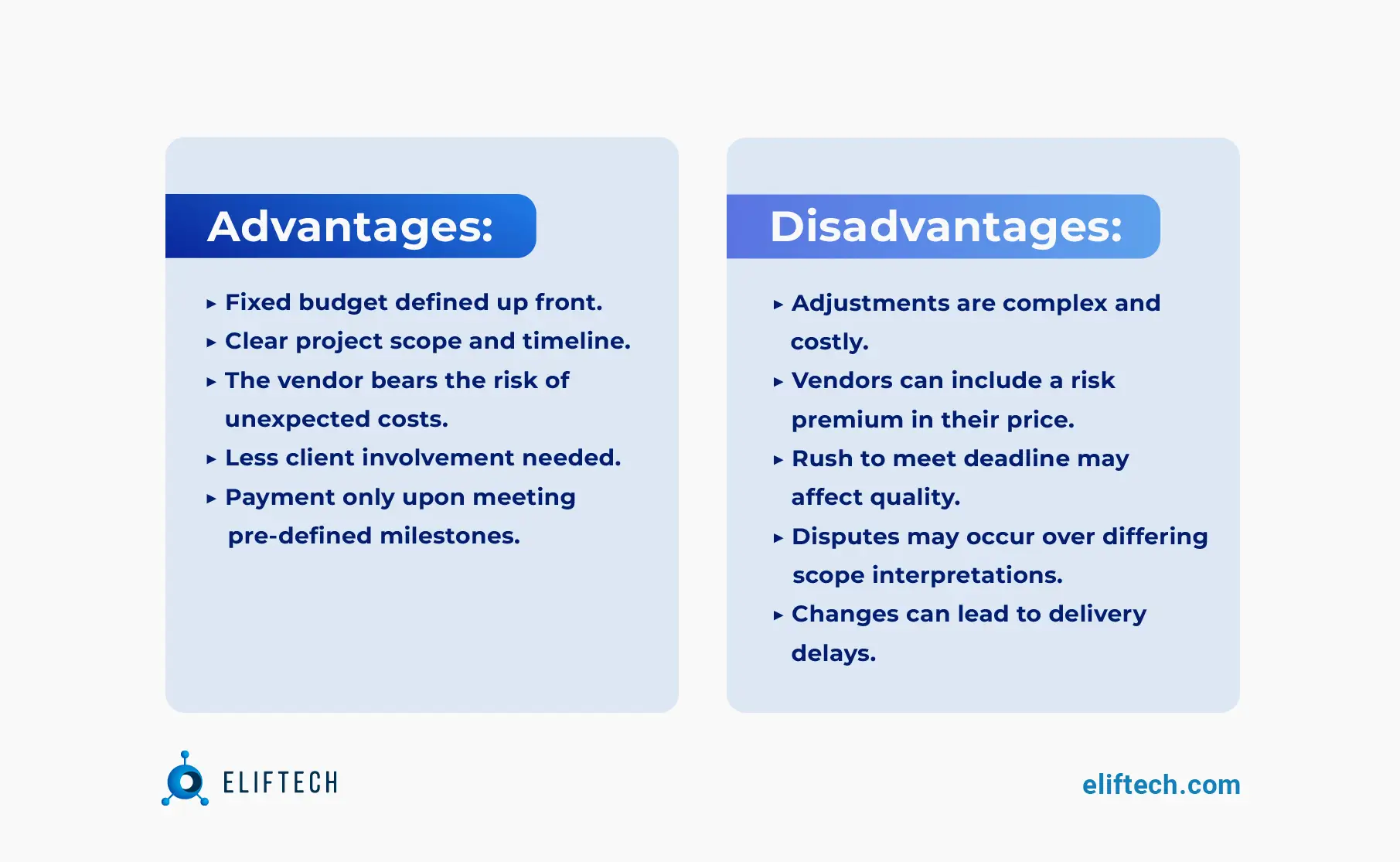
Fixed project contracts can provide a tactical advantage in the right context. This type of contract may initially appear challenging, especially for dynamic projects that are subject to change. However, it's essential to appreciate the broad spectrum of project requirements and environments where this approach can shine. While flexibility may not be a powerful suit, the unique benefits of Fixed Project contracts make it an effective strategy in suitable circumstances.
Pros of Fixed Price Contracts
Fixed Price contracts are particularly praised for their elements of predictability and transparency. Such contracts come with a maximum limit on costs, which makes them an attractive choice for projects with a well-defined scope.
Entrepreneurs appreciate the predictability that comes with Fixed Price contracts. Well-planned business strategies demand definite deadlines and clear financial projections, so these types of contracts provide precise financial figures when planning expenses for the upcoming 1-3 months, leading to a sense of stability and insight into financial projections.
Moreover, with well-defined requirements, a fixed budget, and rigid deadlines, Fixed Price contracts offer a high degree of transparency. These factors together create a clear project roadmap, enabling easier navigation and control of the project.
Another advantage is the ease of management that Fixed Price contracts offer. The payment to service providers is based on the volume of work they complete. This straightforward approach does not need intensive effort to manage, and since the contract contains all the necessary details about the project, continuous monitoring, and regular control are not required.
Cons of FP Contracts
However, on the flip side, Fixed Price contracts are known for their limited flexibility. In case any unexpected changes come up, the responsibility falls on the client, irrespective of whether they instigated these changes or they were outside the vendor's control.
Additionally, due to the requirement for an extensive, step-by-step project plan, Fixed Price contracts often need an extended planning phase. This phase might be useful, but it can present drawbacks for time-sensitive projects that need to get started right away as it could delay the kickoff of the project and consequently affect the timely delivery.
Furthermore, a significant risk associated with Fixed Price Contracts is the potential for overspending. If the project requirements change or additional work is needed beyond what was initially scoped in, extra costs can arise leading to potential budget overruns. Unfortunately, there's no safety net for situations where you end up paying more for less, due to the rigid financial structure. Unexpected changes or requirement modifications can escalate the problem. The only effective way of avoiding overspending is to account for potential extra costs in the initial budget planning phase.
Time and Materials vs Fixed Price: Cheatsheet for Choosing the Right Contract Type
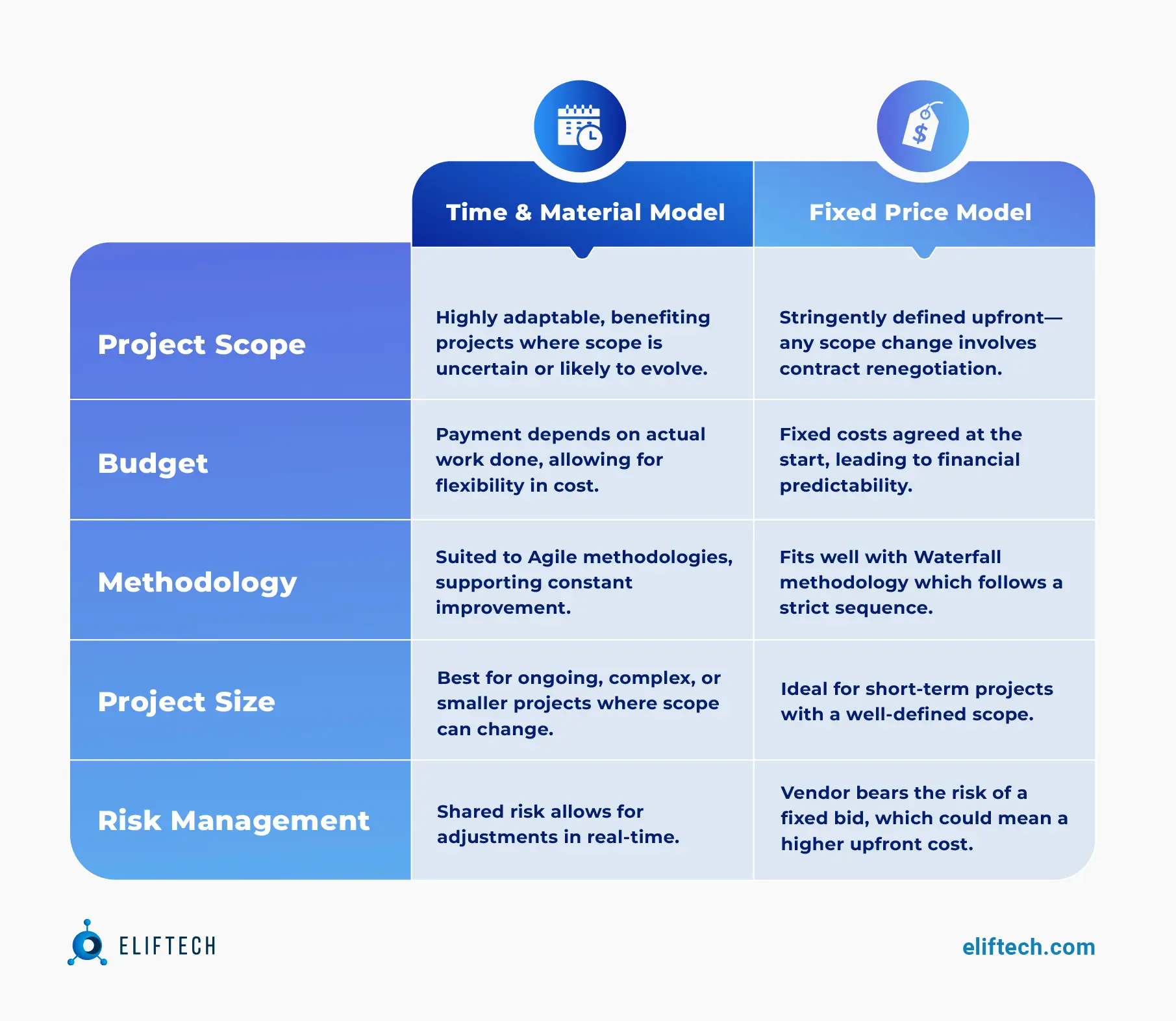
The choice between time and materials vs fixed price should always align with the project's needs and your preferred cooperation style. Although we have not yet learned to read someone's thoughts (which would certainly be helpful), we can at least briefly outline how you should act and what to consider when choosing the right contract type.
- Understand your project's size, complexity, and potential risks. This means having a clear picture of what the project aims to achieve and what challenges it might face.
- Choose a contract type that matches your project's nature. If your project is well-defined and unlikely to change, go for a fixed-price contract. If it's more flexible or expected to evolve, a Time and Material (T&M) contract might be a better fit.
- Consider how much the project might need to be changed over time. Fixed-price contracts offer stability, but T&M contracts provide more room for change.
- Think about your budget and how much control you need over costs. Fixed-price contracts provide cost predictability, while T&M contracts offer transparency and more control.
- Define how actively you want to be involved in the project. T&M contracts typically require more client oversight compared to fixed-price contracts.
- Think about the kind of relationship you want to foster with your outsourcing company. Fixed-price contracts can lead to a more transactional relationship, while T&M contracts promote collaboration and partnership.
- Maintain open and transparent communication with your contractor. Clearly define expectations, deliverables, milestones, and project timelines to minimize misunderstandings.
- In some cases, you might find it beneficial to use a combination of contract types at different project stages. For instance, you can use a fixed-price contract for initial planning and design, and then switch to a T&M contract for the development and QA and testing phases.
If you're still uncertain about whether to choose time and materials vs fixed price model, contact our team and we will provide valuable insights on these contracts and help you to choose the most beneficial for your project.
Conclusion
In software development, the decision time and materials vs fixed price contracts significantly determine how the project proceeds, impacting its cost, timeline, and overall outcome.
In this regard, we leverage our expertise to guide our clients to the most suitable contract type for their projects. Whether working with startups uncertain of their market, medium-sized companies with expanding requirements, or established firms with well-defined projects, we accurately assess the specific conditions and advise on the best contract model choice.
Our goal is to help find the perfect balance between flexibility and predictability, ensuring that their project reaches the desired outcome most efficiently.
- As a software maintenance company, we specialize in handling tasks as they come in a T&M contract, offering a highly flexible and adaptable approach that caters to an ever-changing project landscape. This favors our proficiency in the Agile approach, which mirrors the T&M model's emphasis on flexibility, client collaboration, and iterative development.
- As for the FP model, we excel in devising a comprehensive project plan beforehand, ensuring proficient execution and predictable outcomes. Our strength lies in strategic planning, which makes the most out of the clarity and low management needs inherent in FP contracts.
Regardless of your project's specifics or the contract type you lean toward, our team is here to provide the guidance and insights you need.
